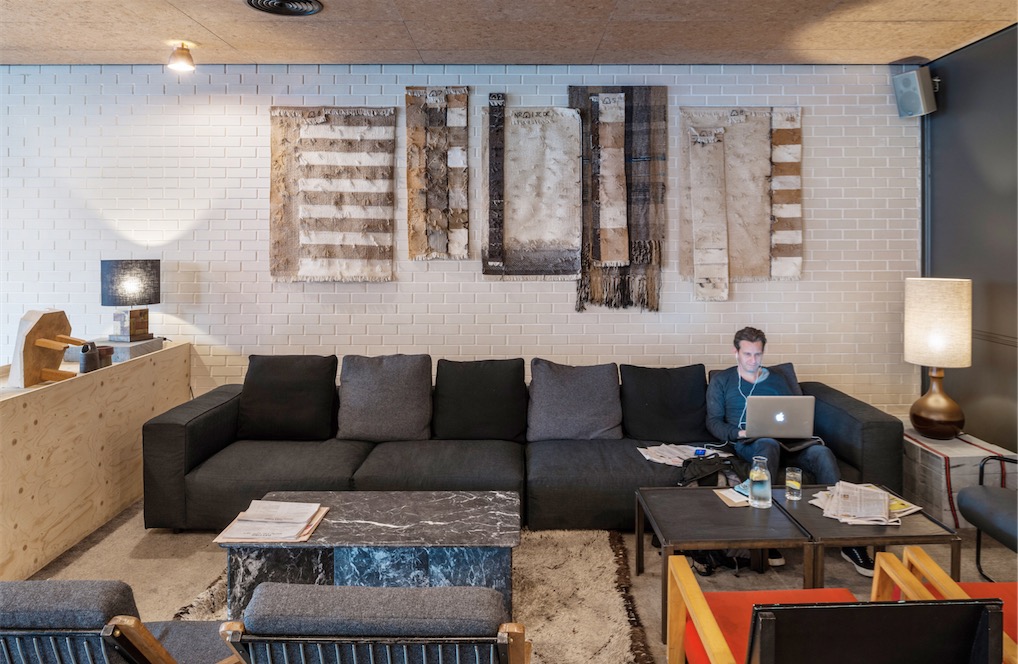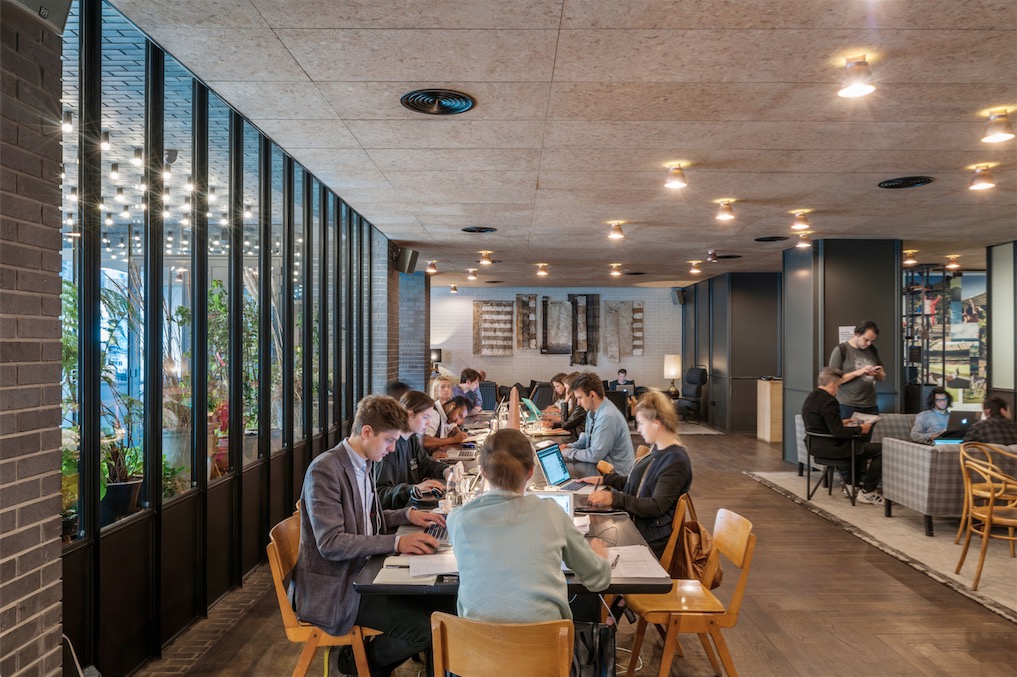Staying Native
To meet the growing demand for authentic places to stay, some hotels have started paying as much attention to their surroundings as to their guests

A guy flicks through a pile of vinyl records, groups of colleagues converse over fresh juices, a girl takes away a newly bought bouquet of owners, while a barista in the corner hands out an endless number of at whites. This sounds like a typical scene at the city’s hippest market on a Saturday afternoon – but it’s not. This is all taking place in the lobby of a hotel on a regular Tuesday morning. The Ace Hotel in Shoreditch, to be precise.
Since the launch of its first venture in Seattle 15 years ago, the Ace Hotel group has been redefining the hospitality sector – by not behaving like a hotel group, but as a patron of creativity and innovation. “Our hotels are a platform to engage the creative community and the entrepreneurial community in the city,” says Ryan Bukstein, Ace Hotel’s director of public relations and marketing, and the group’s cultural engineer. And just as Ace Hotels have spread from Seattle to Portland, New York, Palm Springs and London, their laid back hipness is seeping into a new generation of authentic hotels that celebrate their local culture and create a new way for travellers to understand a city.
Ace – and localised hotels like them – are redefining the hospitality world, just as the wave of Ian Schrager- pioneered boutique hotels did around the turn of the millennium. These designer hotels, which courted young, jet-set, Wallpaper magazine-reading entrepreneurs, fell upon the glitzy, but somewhat cringe-inducing, formula of starchitect + banging club = supercool hotel. But it’s not so easy for today’s local hotels which look to neighbourhood immersion, creativity and authentic collaborations.

For years, a hotel was seen as a refuge from the alien city you’ve landed in, but travellers are getting braver
Hotel groups and individual venues are being inspired by localism. Examples include The Standard and Bunkhouse chains in the US, one-off properties such as Hotel Hotel in Canberra, Australia, or design-led European budget chains like Qbic and Generator hostels. Whether a member of a small group or a standalone property, each revels in the idiosyncrasies and community of its location. They’re all tapping into a shift in consumer demands from luxurious comfort to authentic experience, a desire still underserved by traditional hotel models. “For years, a hotel was seen as a refuge from the alien city you’ve landed in, but travellers are getting braver – they’re now more interested in discovering the environment they’re in than being shielded from it,” says Julie Fawcett, managing director of Qbic.
The ease of online communication has enabled people to have a back-up for that bravery, as they can learn from other people who have taken the leap to try an unusual location or untested hotel. International networks of friends and peers, plus the growth of Airbnb, have also boosted travellers’ bravery. While much of the initial appeal of the P2P site was the lower cost of staying in someone’s apartment rather than in a hotel, it’s the ability to live like a local in a foreign city that really appeals. A recent survey of travel agents by American Express found that 34% of travellers are “specifically looking to immerse themselves in the destinations they visit”.
“There is a new generation of travellers looking to experience a city like a local. Hotels now have to offer more than just a bed to sleep in,” says Janneke Heijer, head of communications at Volkshotel. Guests are looking for hotels to help them get under the skin of the area, rather than making them feel like tourists. And to make a hotel and its guests feel native, hotels must “go out to the local community and bring it in,” says Fawcett.
It’s becoming standard practice for authentic hotels to welcome in the creative population of its surrounding area: Ace Hotels host ‘takeovers’ by creatives such as Jocks & Nerds magazine or up-and-coming product designers, while Volkshotel runs an artist-in-residence programme. Local creatives also make their presence known throughout these hotels, which stock artisan snacks and microbrewed beer, fill their rooms with art, and sell niche products on-site and online.
Greater community collaboration places hotels at the social heart of the neighbourhood they inhabit, with unique events, club nights, restaurants and bars created by the area’s hottest people, while busy lobbies fuelled by coffee and Wi-Fi have become co-working spaces and meeting rooms, where guests can run into creatives, entrepreneurs and even the occasional world famous designer.
Ben Pundole, hotelier and editor-in-chief of the website A Hotel Life, agrees: “People don’t care about traditional brands anymore – being surrounded by like-minded people is more important.” According to a US survey by Chase Card Services, millennial travellers are more likely than other groups to want to meet other people staying at their hotel, with 57% wanting to mingle.
However, meeting other travellers isn’t quite enough immersion for today’s jet-setters. They also want to get acquainted with the locals, and these hotels, by providing great amenities beyond those just used by guests, prove conveniently popular destinations for their city’s permanent inhabitants. This in turn offers the guests an even richer experience: when guests are able to meet locals, they gain unique insight into things to do or places to go. Feeling like a local is about more than lobby encounters, though – it’s also about understanding the character of the surrounding area. Hotel Hotel’s co-founder Nectar Efkarpidis believes that making a hotel part of its local community is vital to guests’ experience: “You can’t achieve anything of lasting value if you don’t respect the context that it operates in.”
For a hotel to truly become ‘local’ it must also give back to the neighbourhood it inhabits
Hotels work increasingly hard to respect and showcase the creative life of their neighbourhood. Hotel Hotel is so committed to supporting local skills that it spent nine months searching for the right bins for its bathrooms before commissioning a local blacksmith to make them. Ace Hotels’ secret sauce comes in the form of its cultural engineers who are based at each property, working with the city’s creatives to ensure the products and events it hosts are on the cutting edge of what’s happening in the area.
But many of the hotels interviewed for this article were keen to point out that their efforts are more than mere cool hunting – this is community engagement. “When we do a new project, the Ace team spends a lot of time there, meeting people, talking to people, and engaging deeply with the community. It’s immersion stuff,” says Bukstein. Time-consuming and unpredictable, this degree of immersion doesn’t have a magic formula – it’s an attitude. “We are inspired by brands and people who stand for something original, sexy, unique and cultural. It is a ‘you know it when you see it’ feeling when we consider who to form a partnership with and how to curate a space,” says Josh Wyatt, director of hotels for Patron Capital Partners, which owns Generator.
But with the new wave of hotels making so much effort to blend seamlessly into the life of its location, is the hotel making the area or is the area making the hotel? Pundole believes that hotels have always de ned the areas they inhabit – with legendary places such as The Plaza in New York and Claridge’s in London becoming landmarks. Local hotels are becoming landmarks in a different way now – bestowing legitimacy on up-and-coming areas, or adding coolness to overlooked ones. “The Ace in New York opened in a strange neighbourhood full of African perfume shops, but the presence of a creative, stylish hotel changed how people think about the Flatiron district, and now a NoMad hotel has opened there too,” says Pundole.
In London, the Ace invigorated a strangely blank part of the otherwise buzzing Shoreditch High Street, by introducing local florists That Flower Shop, a Lovage juice bar, a much-anticipated London outpost for Opening Ceremony and a vinyl-only branch of Sister Ray. It’s an approach that other local hotels are taking on: Volkshotel is working with Amsterdam Dance Event and Unseen Photo Fair, while the Wythe Hotel hosts pop-ups from the likes of APC and ethical leather brand Marlow Goods as well as a Dinner with Friends series in conjunction with some of America’s most talked-about restaurants, including Oakland’s Ramen Shop. Meanwhile, Standard hotels has an ongoing partnership with eyewear brand Warby Parker. For those who are just starting out, pairing with a hotel can open up a customer base, but it certainly doesn’t do the hotels any harm either – the halo effect of allying with the latest names in fashion, music, design and food helps to keep hotels current.
Chic or artisan partnerships are one thing, but Pundole points out that for a hotel to truly become ‘local’ it must also give back to the neighbourhood it inhabits. In Amsterdam, Volkshotel provided a disused newspaper building slated for demolition with a new lease of life, while Qbic focuses on regenerating rundown buildings and transforming them into affordable hotels. Qbic’s London property, in the multicultural area of Whitechapel, works with local groups to improve the safety and wellbeing of people who live in the neighbourhood. The hotel is decorated through a partnership with the Café Art project, which works with formerly homeless artists, and collaborates with FoodCycle to limit food waste. The team is also working with the local council to improve the nearby Altab Ali Park by helping with planting, adding new lighting and benches, and introducing communal ping-pong tables. Meanwhile, Generator hostels are developing relationships with local people by supporting local talent in f_i_elds such as art, music, dance and performance, and identifying neighbourhood charities, causes and activities to sponsor.
And while hotels all have the same fundamental purpose, local hotels are taking a different tack to traditional brands – they’re determined to enrich the lives of those in the area and to provide a platform where local people can explore their creativity, as much as being a way for visitors to explore the local area. As Efkarpidis puts it, “That’s a local hotel’s magic formula.”


